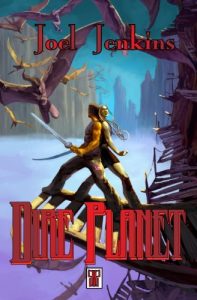 “Thrust into the savage Martian past, Garvey Dire must solve the mystery of time in a world of alien monsters and brutal violence or see his own world destroyed by war.”
“Thrust into the savage Martian past, Garvey Dire must solve the mystery of time in a world of alien monsters and brutal violence or see his own world destroyed by war.”
I’m currently reading Dire Planet, a novel by Joel Jenkins, one of those guys who (I think) hangs around with the New Pulp crew. I’ll have a full review of the book over at the Castalia House Blog in a week or so, but wanted to take a few minutes to provide my early impressions and to provide some context.
My first encounter with Joel’s work came about as a result of a crossover that he did with Derrick Ferguson. In Ferguson’s Four Bullets For Dillon, the eponymous Dillon meets up with Jenkins’ rock star mercenary, Sly Gantlet, in a high class nightclub where the two are attacked by a man with a vendetta against both of them.
I was not impressed. The whole story came off a little too try-hard for my taste. The tale spent too much time telling the reader how bad ass the heroes are and too little showing the reader how bad ass the heroes are. As a result, I’ve shied away from Joel’s work for over a year now.
I’m want to say right here and now, that was a mistake.
I’ve bumped into Joel a few times on social media. He comes across as a good guy, and I have to give both he and Derrick Ferguson credit for bailing on Big Publishing, and for helping to kickstart a renewed interest in pulp style fiction years before I realized such a thing was even possible.
In was in the mood for some planetary romance, and liked my encounters with the guy. As one of the CH Bloggers tasked with plumbing the jungle of self-publishing for the lost shrines and hidden gems, it was high time to take another look at Joel’s work, and I’m glad I did.
Garvey Dire makes for a great hero – he is both heroic and flawed, and is motivated for all the right reasons. The women of the Dire Planet are strong but retain their femininity – that’s a neat trick that few modern writers manage. Jenkins’ version of Mars strikes a careful balance between “the same but different” when compared to the Burroughsian elephant in the Martian Room. He adds and unexpected element of modern action that interweaves with the story of Garvey Dire in a way that shouldn’t work, but does.
At the halfway point, there’s a lot of time left for this book to fall flat on its face, but I don’t think that’s going to happen. At this point, I’d recommend Dire Planet to anybody who wants to see how pulp style writing can be seamlessly wedded with modern action. And I’d also recommend it to anyone who wants to join in the conversation when my full review goes up at the CH Blog. (Which will probably be next Wednesday).
